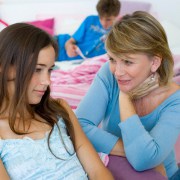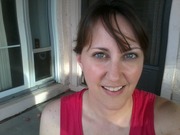 Photo: Getty Images
Photo: Getty Images
A case of mononucleosis will interrupt the busy life of a teen. Mononucleosis or "mono" is a viral infection that causes symptoms similar to the flu. Mono is caused by the Epstein-Barr (EBV) virus, a common virus that children are often exposed to while growing up.
Although most infants and youngsters that get EBV don’t develop any symptoms, teens that are exposed to EPV often develop mono. In fact, according to the Centers for Disease Control, 35 – 50 percent of adolescents who are exposed to EBV also develop a case of "the kissing disease".
Mono is often referred to as the kissing disease because the virus is transmitted through saliva. It can be spread by a cough, sneeze, or sharing straws or other eating utensils.
Symptoms of mono are similar to the flu and include constant fatigue or weakness, fever, sore throat, swollen lymph nodes, head and body aches, skin rash, or abdominal pain. The Mayo Clinic reported that if these symptoms don’t resolve themselves with rest in about a week, your teen could have mono.
During a physical exam, your teen’s doctor will look for signs of swollen tonsils, lymph nodes, spleen or liver. Your health care provider may also perform a blood test. The Mayo Clinic explained that two types of blood tests are used to confirm mono.
A monospot test will detect antibodies for the Epstein-Barr virus. Results for a monospot test are usually ready in about a day.
A white blood cell count can also be used. While the white blood cell count can’t confirm that the EBV is present, it will detect an elevated number of white blood cells, which means the body is fighting infection.
Bed rest and fluid intake will help a teen recover. Antibiotics may be prescribed if your teen develops a secondary infection like strep throat or a sinus infection.
The Mayo Clinic reminded parents that mono may also cause an enlarged spleen. In severe cases, the spleen can rupture, causing sudden pain on the left side of the stomach. If this occurs, seek immediate medical attention for your teen.
In fact, Mayo Clinic recommended that teens wait at least a month before returning to sports or other physical activities. Parents can also remind a busy teen that rest is important and he or she may not feel completely well for two to three months.
Sources:
The Mayo Clinic. Mononucleosis. Web. 4, Jan. 2012.
http://www.mayoclinic.com/health/mononucleosis/DS00352
National Centers for Disease Control. Epstein-Barr Virus. Web. 4, Jan. 2012.
http://www.cdc.gov/ncidod/diseases/ebv.htm
Reviewed January 5, 2011
by Michele Blacksberg RN
Edited by Jody Smith






Add a CommentComments
There are no comments yet. Be the first one and get the conversation started!